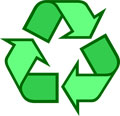From Cans to Carpet: SU Recycling Program is Far Reaching
 SALISBURY, MD---Approximately one-third of American homes recycle paper, glass and aluminum. But how many recycle carpet?
SALISBURY, MD---Approximately one-third of American homes recycle paper, glass and aluminum. But how many recycle carpet?
A clause mandating that contractors recycle all carpeting removed from campus buildings is just one of the many ways Salisbury University is making a difference for the environment.
“We’ve kept quite a few tons out of the landfills,” said Rebecca Rosing-Johnson, director of SU’s Horticulture Department, which oversees recycling on campus. In 2006 alone, SU recycled more than 500 tons of items ranging from paper and glass to electric motors and oil.
“Recently we’ve gotten heavily into recycling electronics,” Rosing-Johnson added. Since 2003, SU has recycled 70 tons of its old computers and audio-visual equipment, not only helping the environment, but allowing the University to save money in disposal fees, she said. Some 17.78 tons of electronics were recycled in 2006, their parts processed for recycling or reuse in a secondary market.
SU’s recycling program began in 1990, when University Dining Services workers were encouraged to recycle tin and aluminum cans. The program was expanded in 1995 when campus officials began looking at ways to reduce the amount of trash projected from the Commons, then under construction. The program’s reach has only grown since then.
“It’s come a long way from the early days,” said Rosing-Johnson. “We’re very proud.”
In 2003, SU was recognized by the Maryland Recycles Coalition for “Outstanding Environmental and Community Leadership.” As a certified arboretum, SU has also has won the Green Award from the Maryland PLANT (People Loving And Nurturing Trees) Community for its commitment to forestry.
Success is often found in the details when it comes to environmental friendliness at SU. Most cleaning supplies, from glass cleaner to carpet shampoo, are GS-37 certified, meaning they are biodegradable. Cleaning equipment, such as mops and pads, are laundered in-house, reducing the frequency of replacement. Even core hours for housekeeping staff have been changed from 10 p.m.-6:30 a.m. to 4 p.m.-12:30 a.m. to reduce the amount of electricity and oil needed to light and heat buildings for cleaning.
Throughout campus, new benches will be made from recycled material. Student employees weed planting beds, replacing weed killer that could prove toxic through runoff. Ivory soap and water are used instead of chemicals to help remove insects from campus plant life. Mulching blades are used on SU lawnmowers so grass clippings and leaves are able to be left on lawns, reducing waste and adding nutrients to the soil. SU’s paper consumption is also becoming more environmentally friendly. Paper purchased for office use is made of 30 percent recycled materials and then recycled itself.
“We have established these measures as part of the routine,” said Greig Mitchell, vice president of administration and finance at SU. “It’s not something we take lightly.”
For more information call 410-543-6030 or visit the SU Web site at www.salisbury.edu.
